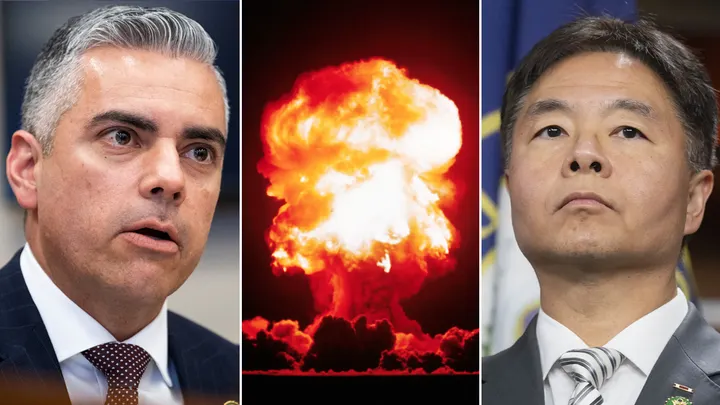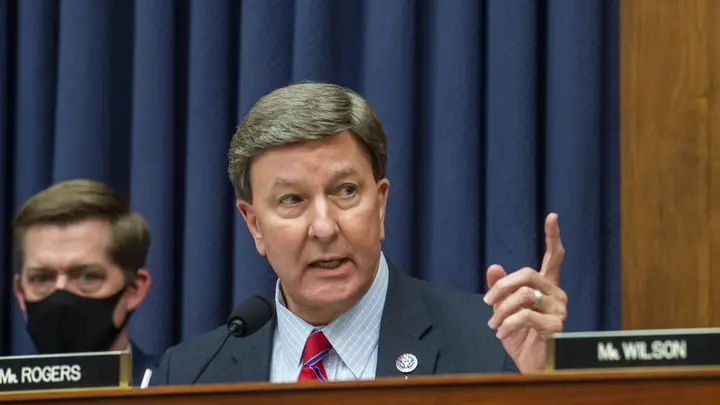The House may soon take up AI-related amendments to the NDAA

Concerns regarding the potential for an artificial intelligence system to autonomously initiate a nuclear attack have prompted lawmakers in the House to propose legislation that guarantees human control over America’s nuclear arsenal.
Representative Ted Lieu, a Democrat from California, has introduced a bipartisan amendment to the 2024 defense policy bill. The amendment mandates that the Pentagon establish a system that ensures “meaningful human control” is necessary for launching any nuclear weapon. The amendment defines human control as requiring people to have the final authority in the selection and engagement of targets, including determining the timing, location, and method of using a nuclear weapon.
Biden uses Independence Day to Call for Tougher Gun Control Laws
Senior military leaders have emphasized that they already adhere to the principle of human control in utilizing artificial intelligence (AI). AI advisors at U.S. Central Command stated in April that their objective is to leverage AI to rapidly analyze data and provide options to military leaders, while ultimately granting humans the ultimate authority in making tactical military decisions.
Nevertheless, the bipartisan support for Rep. Lieu’s amendment highlights lawmakers’ growing concerns about the possibility of AI independently executing decisions based on its rapid assessment capabilities. Lieu’s amendment, proposed as part of the National Defense Authorization Act (NDAA), has garnered support from GOP lawmakers Juan Ciscomani of Arizona and Zachary Nunn of Iowa, as well as Democrats Chrissy Houlahan of Pennsylvania, Seth Moulton of Massachusetts, Rashida Tlaib of Michigan. , and Don Beyer of Virginia.

House Republicans are expected to begin the process of selecting amendments to be voted on the House floor for the National Defense Authorization Act (NDAA), potentially as early as next week. With over 1,300 proposed amendments, the amendments related to artificial intelligence (AI) indicate that Congress may address the issue incrementally rather than through comprehensive legislation.
Oil drilling and mining are being restricted by a Biden administration eco rule
Representative Stephen Lynch, a Democrat from Massachusetts, has introduced a similar amendment to the NDAA. This amendment would require the Defense Department to adhere to the guidance issued by the Biden administration in February regarding the responsible use of AI and autonomy in the military.
The non-binding guidance issued by the Biden administration highlights several important principles. One of these principles emphasizes that nations should ensure human control and participation in any actions that are crucial for making informed decisions and carrying out sovereign choices regarding the use of nuclear weapons.
The guidance further suggests that states should develop and construct military AI capabilities in a manner that enables them to detect and prevent unintended consequences. It also emphasizes the importance of incorporating mechanisms that allow for disengagement or deactivation of deployed systems if they exhibit unintended behavior. Additionally, the guidance emphasizes the need for implementing appropriate safeguards to minimize the risks associated with significant failures.
While some amendments to the NDAA focus on restraining AI, not all of them share this objective. Representative Josh Gottheimer, a Democrat from New Jersey, has proposed an amendment that seeks to establish a U.S.-Israel Artificial Intelligence Center. This center would facilitate collaborative research on AI and machine learning with military applications.
The proposed amendment suggests that the Secretary of State and other relevant federal agencies, given the availability of funding, could enter into cooperative agreements to support and enhance dialogue and planning between the Department of State or those agencies and the Government of Israel, including its ministries, offices, and institutions.
Rep. Rob Wittman, a Republican from Virginia, has proposed an amendment that would oblige the Pentagon to establish a procedure for testing and assessing large language models such as ChatGPT. This evaluation would cover aspects like the accuracy of factual information presented and the potential presence of biases or the promotion of disinformation.
Furthermore, the bill, which was approved by the House Armed Services Committee last month, already contains provisions that would require the Pentagon to establish a process to ensure the responsible development and use of AI. Additionally, it mandates the examination of the feasibility of employing autonomous systems to enhance the military’s operational efficiency.
